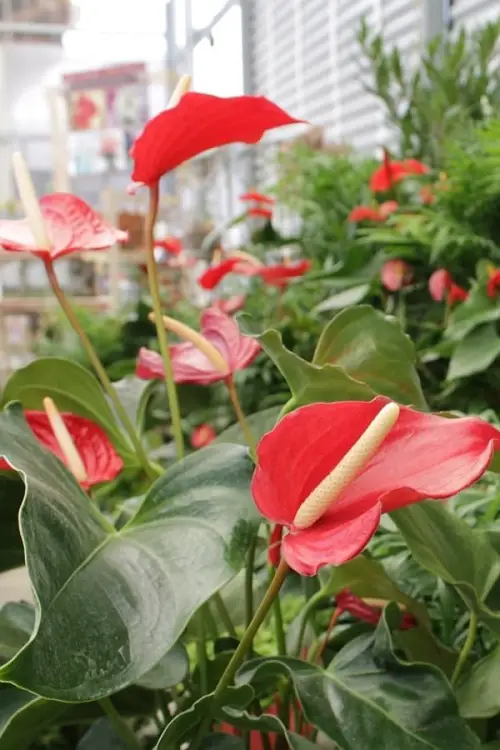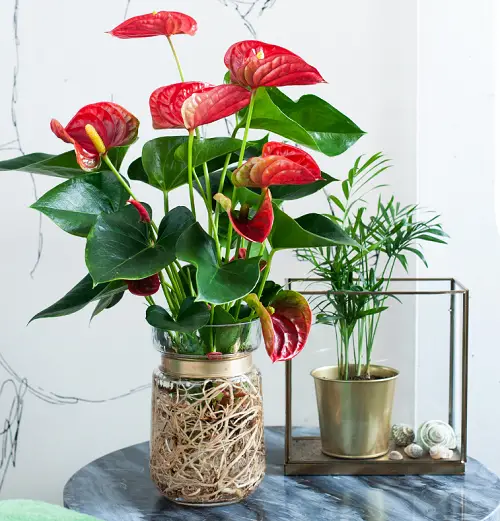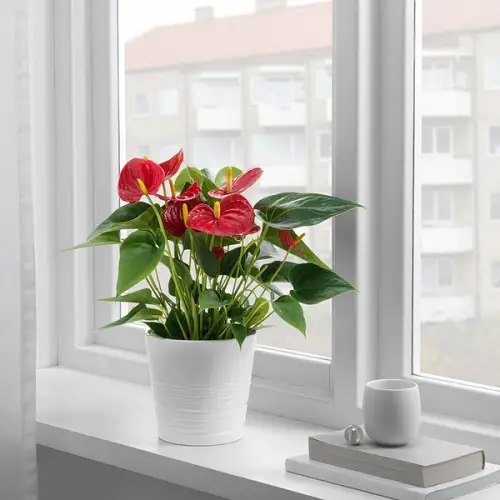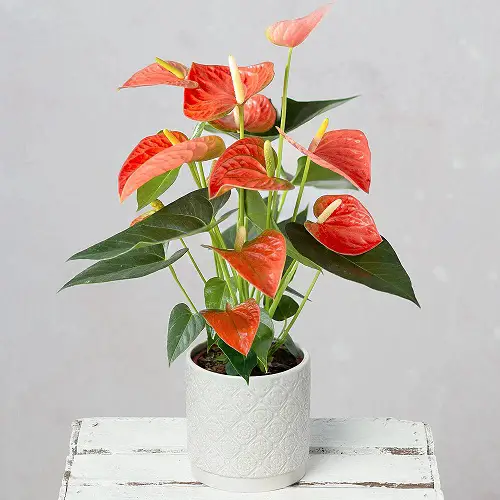The Flamingo Flower adds appeal to any indoor space! Knowing these Anthurium Plant Care tips will help you keep them flowering for a long!
Here are some top Anthurium Plant Care tips that will help you keep this beautiful plant flowering and thriving all year round!
Botanical Name: Anthurium andraeanum
Other Names: Tail Flower, Laceleaf, Flamingo Flower, Oilcloth Flower, Pigtail Plant, and Painter’s Pallet.
Look at the Tips on How to Grow a Big Anthurium Plant
Anthurium Plant Care Tips

1. Take Care of the Sunlight
It is important to ensure that the plant gets proper light exposure. Anthuriums prefer bright, indirect light and should not be exposed to direct sunlight. If the leaves start to yellow, the plant is getting too much light. If the leaves start to droop and look pale, the plant is not getting enough light.
The best is to expose them to the mild morning sun for 2-3 hours and then keep them in indirect light for the rest of the day.
2. Always Go for the Right Pot Size
To add to the beauty of plants, you can use pretty 6-8-inch ceramic pots! A small anthurium plant can adjust well in a 4-5-inch pot, too. Once it outgrows the container, repot it into a bigger pot.
3. Plant them At the Right Time
The best time to plant anthurium is spring or summer. If you live in a warm climate, plant them anytime except in the hot summer months.
4. Use the Correct Growing Medium
It is important to use the right growing medium. Mix equal parts of perlite, peat moss, and pine bark. You can also go for 40% potting soil, 40% orchid mix with some charcoal, and 20% peat moss combination.
5. Water them Right
Anthuriums are tropical plants that need to be kept moist but not wet. Watering anthuriums should be done thoroughly, and allow the topsoil to dry out slightly between waterings.
If the soil is kept too wet, the roots will rot, and the plant will die. Water anthuriums with room temperature water in the morning or afternoon. Ensure to water the soil, not the leaves, as this can cause leaf spots or other fungal diseases.
6. Expose the Plants to the Correct Temperature
The plant will flourish in a temperature range of 65-80 F (18-28 C). It is adaptable, making it do extremely well in household temperatures! Avoid keeping the plant near the heater or AC vents.
Anthuriums don’t like temperatures below 55 F (12 C) and above 90 F (32 C).
7. Use the Right Blend of Fertlizer
During the growing period, feed your plants with a weak dose of balanced liquid fertilizer. Only 20% of the manufacturer’s recommendation once in 10-14 days should be fine.
If you notice salt buildup and overfertilization, reduce feeding them. If you are looking forward to having more flowers, you can go for a high-phosphorus blend.
8. Pruning is Important to Keep them Tidy
Pruning this plant is not necessary, but it can be helpful. It will also help in encouraging new growth and maintaining a healthy, attractive plant. If your anthurium has become too large or leggy, you can gently prune it to maintain its shape.
To prune an anthurium, use sharp shears or scissors to remove any brown, dead, or diseased leaves, stems, or flower stalks. Cut back the plant to a point just above a healthy leaf node or stem.
You can also remove any long, leggy stems that are not producing leaves. Pruning anthuriums should be done sparingly, as they are slow-growing plants.
Note: The sap, due to the calcium oxalate crystals, is toxic. Always wear protective gloves before trimming the plant, which can cause skin irritation.
9. Take Care of the Humidity
The best environment for Anthurium plants is one with high humidity. Aim for a relative humidity of between 50-70%.
To increase the humidity around your Anthurium plant, you can use a humidifier, mist it with water, or place it near other plants that release moisture into the air.
You can also keep its pot on a pebble tray filled with water.
Check out White Anthurium Varieties
Are Anthuriums Toxic?
Yes! They are! As the plant has calcium oxalate, it can cause swelling of mucous membranes and skin irritation if ingested.
So, if you have a cat, dog, or child in your house that loves trying everything, be extra careful. If your pets ingest the plant and you notice any of the above-mentioned conditions, then contact your regular vet immediately.
Growth Rate of Anthurium Plants
The growth rate of Anthurium plants will depend on the variety and growing conditions. Most Anthuriums are slow-growing and can take up to a year to reach their full size.
The growth rate can also be affected by light, water, and temperature. Generally, with the right conditions, these plants can grow up to 8-10 inches a year.





